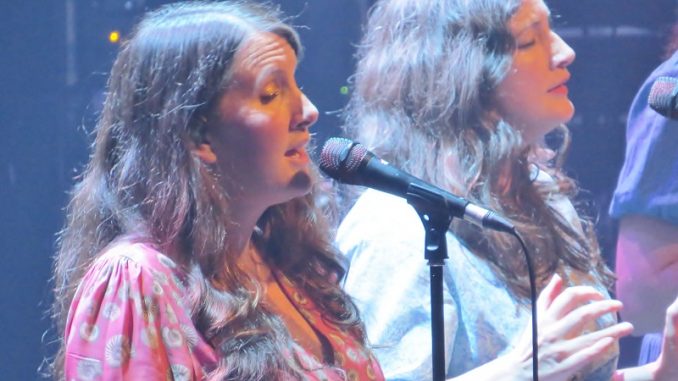
It’s been a busy weekend for The Unthanks as they celebrate the reissue of three of their early albums, ‘The Bairns’, ‘Here’s The Tender Coming‘ and ‘Last.‘ It’s quite the undertaking – to play all three albums with guesting from their original tour supports from the first time around with these song collections. And to do all that twice – yesterday at The Sage and then today at The Barbican. And it truly was an all-day event – starting with “A Big Sing” on the Barbican’s concourse, an afternoon concert in the main hall with Rachel Unthank & The Winterset performing ‘The Bairns‘, with the promise of special guest Devon Sproule, a freestage performance by Lucy Farrell with special guest Kris Drever, a Q&A with the Unthanks and then a final evening concert of ‘Here’s The Tender Coming’ and ‘Last‘. That might sound like a folk endurance test, but in fact it was a joyful breeze.
And so it was that on a wonderfully warm September day, The Barbican took on the mantle of a one-day folk festival, with groups milling about between sessions and gig, or taking in the sun on the lakeside terrace, the idea of The Barbican as an urban utopia realised in full. The opening event was “The Big Sing”, which perhaps alongside the getting everyone involved motive also acted as a warm-up for the Unthank sisters and had the potential to seed the audiences later in the day with people who’d practiced the sing-a-long bits. Maybe, this time, there would be a good number who would indeed sing-a-long, it’s something that Folk gigs at large venues such as this do struggle to achieve.
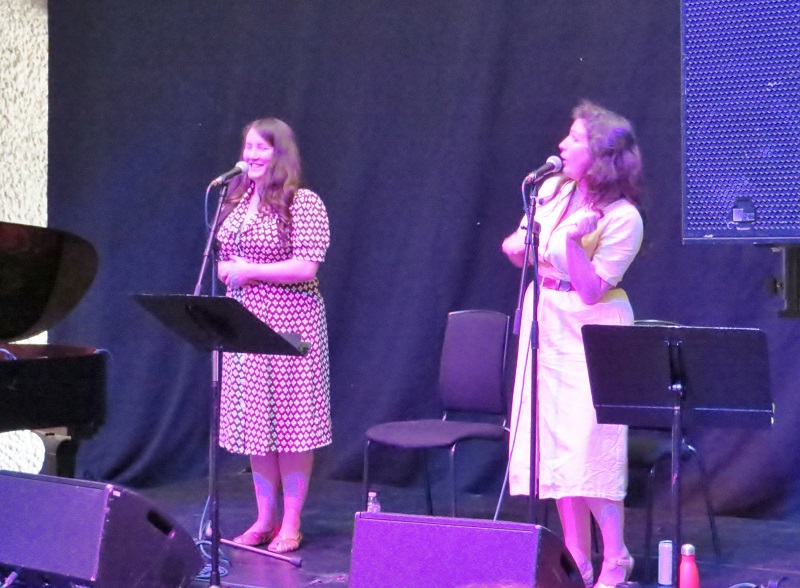
If nothing else the “Big Sing” did reinforce the pure joy of losing oneself to the anonymity of a blend of several hundred massed voices. As well as the chorus of several of the songs to be featured later there was a surprise “new shanty” which Rachel Unthank had decided to learn – although it’s hard to believe that ‘Haul on the Bowline‘ was new to anyone who’d spent their childhood at folk festivals. Other songs, picked from the repertoire of the Unthanks’ singing holidays pub session material, were a superfast ‘Byker Hill‘ and a lovely ‘Sorrows Away‘.
The afternoon continued with the first of two gigs in the Barbican’s Concert Hall, covering the whole of ‘The Bairns‘, the 2007 album credited to Rachel Unthank and The Winter Set, after an opening set by Devon Sproule. Devon had toured with the Unthanks around the time of the album’s release, which played in to the revisiting theme of the day. There was a double bonus for myself as the first time I had really come across Devon Sproule was at the 2011 Canadian Blast gig at The Barbican: on that occasion with a band she had made a huge impact with her combination of distinctive vocals, folky-jazzy style and winning personality. And it’s all the same a dozen years later solo with just an acoustic guitar.
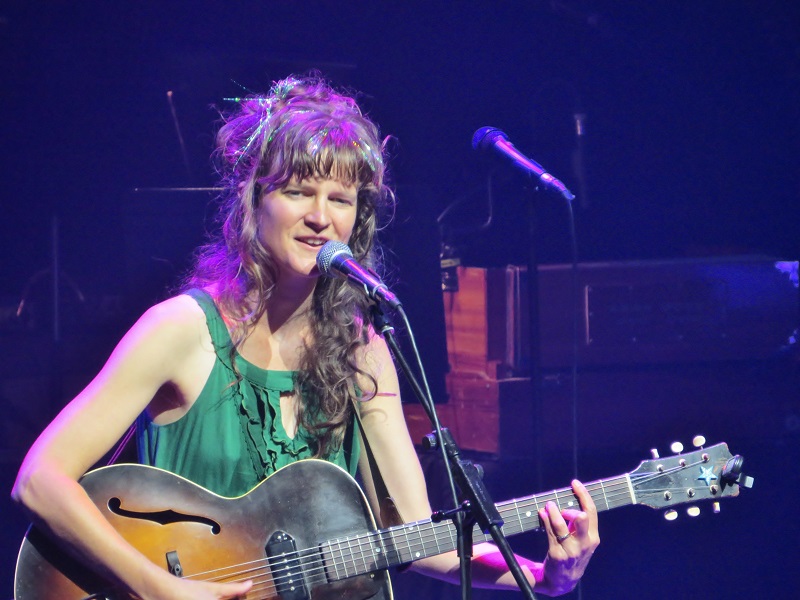
Her short set centred around a clutch of songs from ‘Colours‘ with ‘You Can’t Help It‘ slipping into gender equality as Sproule sang “I don’t believe she loves us all the same” whilst ‘The Fan‘ lovingly feared that Austin in the Summer might be too hot and the superbly pacey ‘You Can Go Home‘ proffering a perfect metaphor for moving up a notch in one’s music – with Sproule singing “when I began this I ran a fast ship” before noting that now when things go wrong, “one body is not enough to get this boat up.” As well as being a really fine singer, Sproule has great between song observations – almost apologising for playing so many old songs, explaining that it “used to feel like a cop out, but we’re celebrating past things” before a pacey and jazzy ‘Old Virginia Block‘. Introducing a relatively new song she noted that “I wrote this when I turned forty – went to the woods with my gal friends and took a couple of ‘shrooms…just a couple” – which provided the insights encapsulated in the song that “I am a worm in need of a squirm” and, perhaps more crucially, a wish to be Australian – permanently laid-back, unworried and never far from a barbeque. In complete contrast was ‘The Gold String‘ a complex song that slowly unravels in different direction as Sproule imagined the interconnections between people who show each other love – and how these imaginary connections can be made real. That’s Devon Sproule, always hard to pin down, but always with a song that’s worth hearing. The too short set closed out with Becky Unthank providing additional vocals on the sublime ‘Plea For A Good Night’s Rest‘, a kind of dark lullaby with one of the most beautiful verses ever created: “Come revenant, come, come ye gentle host / To my patient hip and across our sleeping coasts / Lay down your mantle, shot through with gold / That we may lie again, here in sweet repose.”
Rachel Unthank and The Winter Set – a band that look suspiciously like The Unthanks – took to a crowded stage, played on by the very album that they were about to recreate. ‘The Bairns‘ set something of a template for The Unthanks – traditional songs from the North East often accompanied on piano by Adrian McNally and with a string section playing sensitive arrangements. The concert – quite sensibly, and the same remained true for the later performances – followed the album running order, which meant that the opener was the keening ‘Felton Lonnin‘ with the haunting refrain “The kye’s come hyem, but I see not me hinny / The kye’s come hyem, but I see not me bairn” – and that haunted feeling was carried through to the dramatic stage lighting which left The Unthank sisters in a semi-darkness, mimicking the eerie darkness of the song. This is folk as gothic drama. And The Unthanks would go on to inhabit a series of female figures throughout the songs – the mother yearning for her child; the woman repenting of marrying a rich but abusive drunkard and revelling in plots of getting her own back; the pregnant and abandoned lover who yearns for her virginity – or alternatively, for death. Sombre in tone and lit in washed out blues or blood red it’s a dramatic presentation that retains its power through the singing of the songs – for all else that is going on it is the power of the words and honesty of the vocals that keeps Rachel Unthank and The Winter Set grounded.
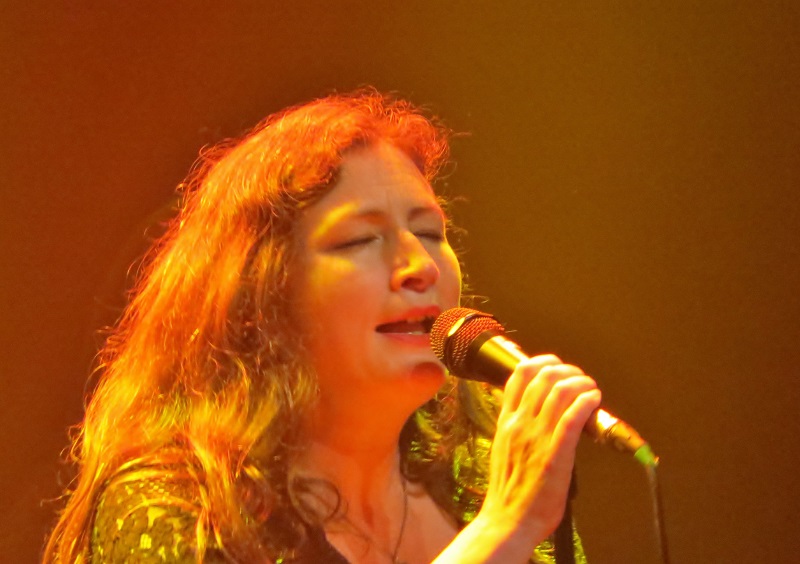
Not that everything is downbeat and gloomy – with clogs donned, ‘Blue’s Gaen Oot O’the Fashion‘ was a wonderfully sprightly medley of sea themed songs that offered the first chance for the audience to show off what they’d learnt in the ‘Big Sing‘ – predictably they fell at the first hurdle. No matter – with feet tapping and the bizarre lyrical juxtaposition that folk can throw up – “the lad with the trousers on he says he will not have me” must have made perfect sense once – it’s blissfully joyful and although cleverly arranged manages to appear so unaffected as to be an almost off-the-cuff creation.
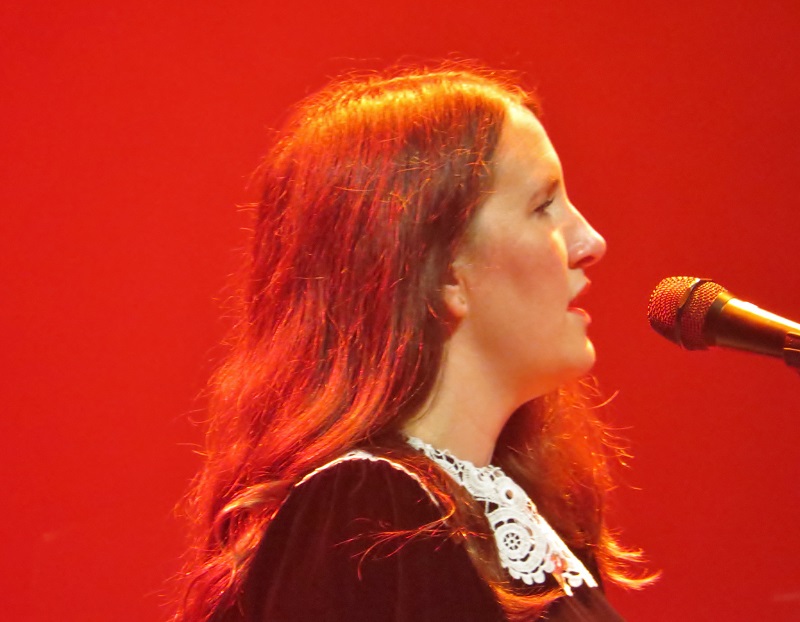
Rachel Unthank and the Winter Set also originally had as a member Belinda O’Hooley who contributed songs to the album and ‘Whitethorn‘ is a standout – the gothic spotlight now alighting on a mother mourning her lost child and yet comforted that she never suffered the hunger and privations that her siblings experience. It’s a crushing listen, and resonates with songs of grinding poverty through the centuries. Owen Hand’s ‘My Donald‘ also has the feel of a nineteenth century lament for the heartache experienced by the families left behind as men go off on whalers for months on end – perhaps never to return.
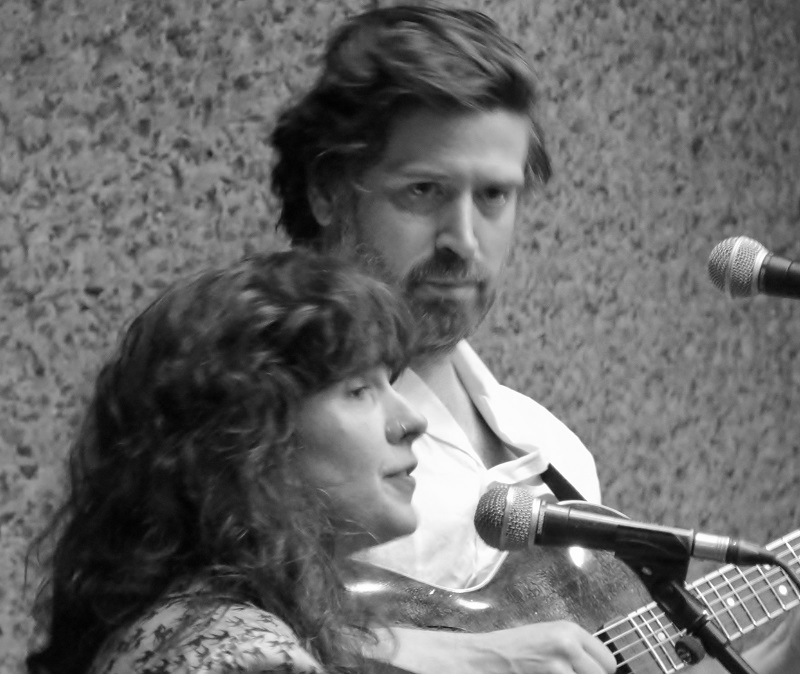
Lucy Farrell and Kris Drever were put on the Free Stage on the main concourse of The Barbican as a “between gig” bonus. Lucy’s songs are gentle things, and despite an attentive audience at the stage itself there was the background sound of an audience of several hundreds finding themselves between gigs and in need of refreshment to fortify themselves for the evening’s offerings. Nevertheless, it was a lovely set touching on birdwatching – and the loss of species as habit is destroyed; impending motherhood – and Selkie thoughts of river swimming; and the dangers of relocating to Canada and finding that it snows quite a bit. As the cafes and bars placated the masses the background noise did fade as the set went on, making for a quite lovely interlude in the end.
There’d been some confusion as to where the next part of the day, the Question & Answer session with Ruth and Becky Unthank and Adrian McNally, the core of The Unthanks, being interviewed by a well researched Elizabeth Alker would be held. It was in the Main Hall it transpired and despite the well lit front of stage and cosy chairs this was no carefully stage-managed event. Questions were quite probing – Alker had gone back and re-read interviews from 2008-11 and it seemed, to her that Becky showed some reluctance to be in the band. This was confirmed to be the case, to some extent at least – older sister Rachel had already completed University, whilst Becky was about to go and as she put it start her own life. All the family tensions of “where do I fit” and “is this my life we’re mapping out” arose – although she has more or less come round to accepting her musical career. A lighter note arose when discussing the “folk is cool” era of the fifteen years or so ago with Elizabeth Alker suggesting that there was “no folk uniform” – with Becky Unthank noting that only someone who has never been part of a dance side could think that.
Adrian McNally revealed his key roles within the band – his approach to the songs and arrangements being quite different as he didn’t come from a Folk and Folk Festival background. His influences at the time of the three albums were Sufjan Stevens and avant-garde music making involving rustling plastic bags. He also noted that they don’t use folk musicians when recording so that they don’t get folk clichés in the playing – The Unthanks sound aiming more for the austere and a wide-open sonic landscape which conveys a certain Northern bleakness. Certainly food for thought going into the evening gig.
‘Here’s The Tender Coming‘ was an album that did more than just carrying that winning formula from ‘The Bairns‘ forward – although there is some similarity with satisfying arrangements, distinctive vocals and a smattering of clogging. It also had more reliance on song writing other than by “Trad” or “Anon” with songs by the likes of Anne Briggs, Ewan MacColl and Lal Waterson. It further differed by expanding the instrumentation – most notably with drums. Adrian Mcnailey’s ‘Lucky Gilchrist‘ is nothing short of a seventies pop song – it even name checks Freddie Mercury – as it recounts the life of a University friend of Rachel’s.
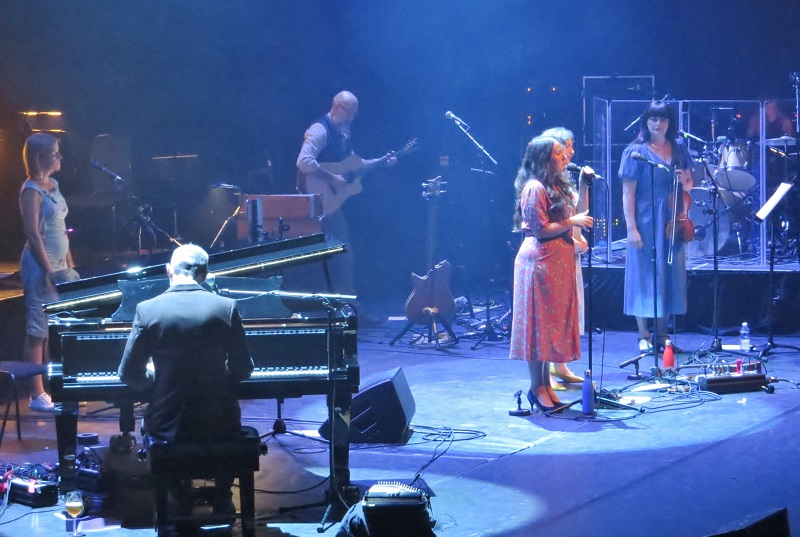
There’s also a move into more clearly political songs – ‘The Testimony of Patience Kershaw‘ is a moving musical interpretation of a transcription of an oral submission of evidence that eventually led to changes in employment law although there’s a rueful sting in the tail as Patience acknowledges that she expects nothing to really change “bless you sir, at least you tried.” Ewan MacColl’s ‘Nobody Knew She Was There‘, inspired by his mother, rails against the treatment of a woman in a society that doesn’t value her – too old, too humble a worker, just the invisible cleaner. With an arrangement that features trumpet and autoharp it is, ironically, one of the shiniest songs in the set, as it turns a grey life into an elegy.
The almost last song of the set, the album’s title track, is of course a perfect misdirection, ‘Here’s the Tender Coming‘ to the modern eye suggests something from the Motown or STAX stable whereas it’s a mournful lament for the deprivation that will follow-on from a visit by the Press Gang coming into port in their ship’s tender with choral singing following a keening violin. It’s a beautifully realised piece.
All this seriousness is leavened with a good helping of the light hearted – ‘Where’ve Yer Bin Dick‘ is a short swearing anticipation jest – roughly equivalent to “I’m not a pheasant plucker.” The ukulele short ‘Not Much Luck in Our House‘ relies on there at least being bad luck but best of all is the Music Hall jollity of the album’s “hidden track” ‘Betsey Bell‘ who is in search of a man…any man really. It is very jolly, and once would have had a theatre ringing with voices singing the final refrain of the chorus all whilst Rachel Unthank leapt accompaniment in her clogs. It’s a strange thing – there are not many places these days where you’ll find more than a thousand people cheering at clog dancing. Maybe there should be, but it’s like stepping into a Bill Tidy inspired alternate reality.
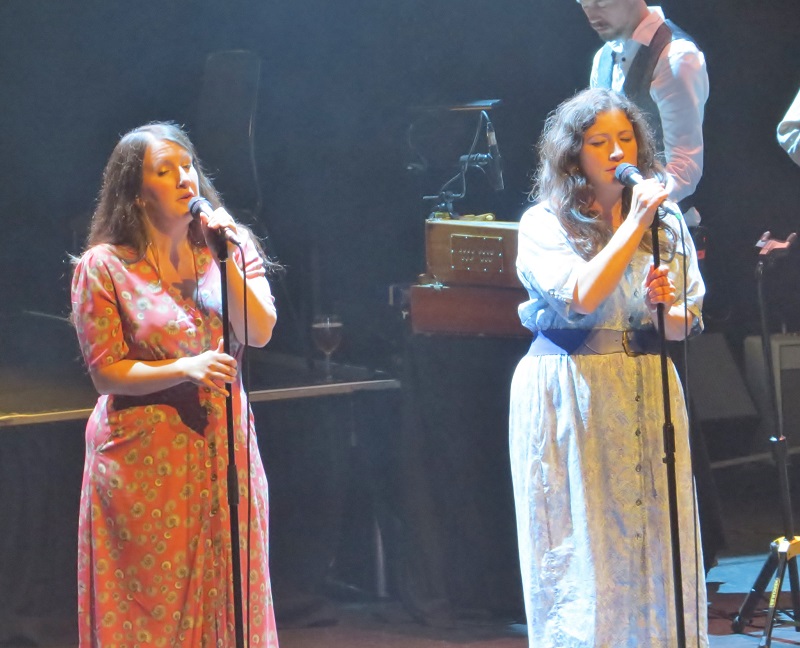
And finally, and with one more change of dress, it came the turn of ‘Last‘. This concluding portion of the concerts opened with ‘Gan to the Kye‘, which is perhaps the definitive Unthanks song – as traditional a tale of lost love as could be imagined but the whole is supported by the string quartet and Adrian McNally on the grand piano, and it develops, slowly, to have a feel of impending dread. But then, Rachel’s singing of ‘The Gallowgate Lad‘ presents another Unthanks theme – the woman with love for the wrong man, who accentuates her error by telling everyone of her sorrow.
This recreation of ‘Last‘ offered several special moments. ‘Give Away Your Heart‘ had never been played live before this weekend, ‘The Queen of Hearts‘ glowed in a fire of desperate love and warm brass accompaniment. The final song of the night ‘Close the Coalhouse Door‘ was described by Rachel Unthank as the saddest folk song she knows, and Alex Glasgow’s song for the play of the same name is a stark condemnation of thoughtlessness – “Mrs Jackson like a fool complains about the price of coal” – that ignores the suffering that the mining industry was steeped in. It ends with the sisters leaving the stage whilst the ensemble played a long powerful coda that bled at last into the gentle refrain of the instrumental ‘Last (reprise)‘.
And what had today taught us? Well, that Rachel Unthank was wrong to suggest during the ‘Last‘ concert that we must be sick of them by now – a day at an Unthank themed folk festival was something to savour. There’s a lot to enjoy in the world that they create – a world of vintage dresses and folk music raised to high art but without in any way giving away its roots in doing so, those heavy clogs keep the music firmly on the ground even as the feet fly back and forth. There’s the frisson of unease in the more gothic tales of loss, there’s the gleam of everyday lives observed with a kind eye, and there’s the bringing into the folk sphere music as diverse as Tom Waits and King Crimson. No, not sick of them yet.


